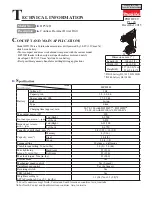
304.8 mm
/ 12 in.
469.
9 m
m
/ 18.
5
in.
LP-Gas Supply System
•
If the information is not followed
exactly, a fire resulting in death
or serious injury could occur.
•
A 20 lb (9 kg) tank of approximately
12 in (304.8 mm) diameter by 18.5 in
(469.9 mm) high is the maximum size LP gas tank to use.
•
The LP gas supply cylinder to be used must be
constructed and marked in accordance with the
specifications for LP –Gas cylinder of the U.S.
Department of Transportation (DOT) or the National
Standard of Canada ,CAN/CSA –B339, Cylinders,
Spheres and Tubes for Transportation of Dangerous
Goods and Commission .
•
The LP gas tank must have a shutoff valve terminating in
an LP valve outlet that is compatible with a Type 1. LP
gas supply cylinder must have a shut off valve
terminating in a valve outlet specified for connection type
QCC1 in the standard for compressed gas cylinder valve
outlet and inlet connection ANSI/CGA-V-1 as applicable.
LP gas supply cylinder must be fitted with an Overfill
Protection Device (O.P.D) The LP gas tank must also
have a safety relief device that has a direct connection
with the vapor space of the tank. This safety feature
prevents the tank from being overfilled, which can cause
malfunction of the LP gas tank, regulator and/or grill.
•
The tank supply system must be arranged for vapor
withdrawal.
•
The LP gas tank used must have a collar to protect the
tank valve.
•
Place dust cap on cylinder valve outlet whenever the
cylinder is not in use. Only install the type of dust cap on
the cylinder valve outlet that is provided with the
cylinder valve. Other types of cap or plugs may result in
leakage of propane.
•
Never connect an unregulated LP gas tank to your gas
grill.
•
This outdoor cooking gas appliance is equipped with a
high capacity hose/regulator assembly for connection to
a standard 20 lb (9 kg) Liquid propane cylinder.
•
Have your LP gas tank filled by a reputable propane gas
dealer and visually inspected and re-qualified at each
filling.
•
Do not store a spare LP gas cylinder under or near this
appliance.
•
Never fill the cylinder beyond 80 percent full.
•
Always keep LP gas tanks in an upright position.
•
Do not store or use gasoline or other flammable vapors
and liquids in the vicinity of this or any other appliance.
•
Storage of an outdoor cooking gas appliance indoors is
permissible only if the cylinder is disconnected and
removed from the outdoor cooking gas appliance.
•
When your gas grill is not in use the gas must be turned
off at LP gas tank.
Proper Placement And Clearance Of Grill
•
Never use your gas grill in a garage, porch, shed,
breezeway or any other enclosed area. Your gas grill is
to be used outdoors only.
Do Not install this unit into combustible enclosures.
Minimum clearance from sides and back of unit to
combustible construction, 36 in. (91.44 cm) from sides
and 36 in. (91.44 cm) from back.
•
DO NOT
use this appliance under overhead combustible
surfaces. This outdoors cooking gas appliance is not
intend to be installed in or on recreational vehicles
and/or boats
.
•
LP gas tank must be stored outdoors in a well-ventilated
area and out of reach of children. Disconnected LP gas
tanks must not be stored in a building, garage or any
other enclosed area.
•
Do Not obstruct the flow of ventilation air around the gas
grill housing. Only use the regulator and the hose
assembly supplied with your gas grill. Replacement
regulators and hose assemblies must be those specified
in this manual.
•
The regulator and hose assembly must be inspected
before each use of the grill. If there is excessive
abrasion or wear or if the hose is cut, it must be replaced
prior to the grill being put into operation. The
replacement hose assembly shall be that specified by
the manufacturer.
•
Pressure regulator and hose assembly supplied with the
outdoor cooking gas appliance must be used. Never
substitute other types of regulator. Contact customer
service for manufacturer specified replacement parts.
•
This outdoor cooking gas appliance is equipped with a
pressure regulator comply with the standard for Pressure
Regulating Valves for LP Gas ANSI/ UL 144.
•
Do not use briquettes of any kind in the grill.
•
The grill is designed for optimum performance without
the use of briquettes. Do not place briquettes on the
radiant as this will block off the area for the grill burners
to vent. Adding briquettes can damage ignition
components and knobs, and void the warranty.
•
Keep the back and side cart free and clear from debris.
Keep any electrical supply cord, or the rotisserie motor
cord away from the heated areas of the grill.
•
Never use the grill in extremely windy conditions. If
located in a consistently windy area (oceanfront,
mountaintop, etc.) a windbreak will be required. Always
adhere to the specified clearance.
•
Never use a dented or rusty propane tank.
•
Keep any electrical supply cord and the fuel supply hose
away from any heated surface.
•
While lighting, keep your face and hands as far away
from the grill as possible.
•
Burner adjustment should only be performed after the
burner have cooled.
WARNING
Your grill will get very hot. Never lean over the cooking
area while using your grill. Do not touch cooking surfaces,
grill housing, lid or any other grill parts while the grill is in
operation, or until the gas grill has cooled down after use.
Failure to comply with these instructions may result in
serious bodily injury.
5






































